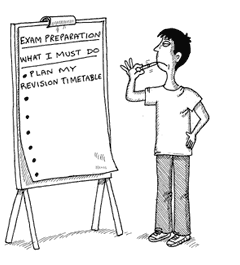| |
Want to head into your exams in tip-top shape? Here's some of our top tips!

Besluit 6-25
SBA Handbook
Guidelines to candidates
CVQ Handbook
Cape SBA Manual for Principles
MAN EAS SBA Manual
ORS SBA Manual
Procedures Manual
Lifestyle
Wake Up.
 You're much less productive when tired after a long day. Getting up an hour or two earlier to study is easy if you do it gradually. Aim for 10 minutes earlier every day over a week and you've gained one hour! Don't ruin your progress by sleeping in more than an hour on weekends. Finish studying at a set time each night: this will encourage you to work hard until your time runs out. It will also get you used to working to finish a task against the clock. You're much less productive when tired after a long day. Getting up an hour or two earlier to study is easy if you do it gradually. Aim for 10 minutes earlier every day over a week and you've gained one hour! Don't ruin your progress by sleeping in more than an hour on weekends. Finish studying at a set time each night: this will encourage you to work hard until your time runs out. It will also get you used to working to finish a task against the clock.
Avoid Distractions.
Study in a quiet place away from family and friends, turn off your mobile and put it in another room, and turn off your internet connection so you won't be tempted by distractions. Give yourself a 5-minute study break every half hour but stay away from Facebook, email, texting etc until the end of your day.
Chillax.
Don't cram right before the exam. Once you’re ready, take the time to relax with friends. Keeping your mind relaxed helps to improve recall, comprehension and thought processes during the exam.
 Preparation Preparation
Prepare & Revise.
Use the school holidays to prepare and revise. The University offers a Year 12 Holiday Program which includes subject preparation, revision and study assist courses designed to help you gain confidence and achieve better results. The courses run each morning so there is still plenty of time to chillax.
Test Yourself.
As you study, add your own ‘exam questions' to a list, making them as hard as possible. A week before your real exam, sit your own 'exam' and see where you need more work. Or do a practice exam in the time limit, noting how long each question took. As well as helping you deal with exam stress, you can see where your knowledge is lacking and where you needed the most time. This will allow you to allocate your time better on exam day.
NB: Note Well.
Write key concepts on paper and stick them around your house. You can revise while brushing your teeth, showering or waiting for the kettle to boil. Or change the way your study material is presented. The more ways you can experience the information you are trying to learn, the better your understanding and recall. Rewrite it as charts, diagrams, graphs, lists, labelled diagrams or flash cards.
Understand?
Teach new concepts to a friend or family member to help you understand the information better and improve recall. Make sure you understand the broader concepts first – this makes it easier to learn the details. And the more you understand something, the more you remember it. When you read something for the first time, make a note of what you don’t understand and get clarification on these bits. When you read it again, it should make more sense and be easier to remember.
 Time Time
Look It Up.
If you forget a piece of information, look it up. You'll get the right answer, save time and - according to research - avoid learning the 'error state' instead of the correct answer.
Timetable.
Break things down into manageable chunks. For example, if you are studying five subjects and you have three weeks to revise, you could study each subject in half-day blocks. That gives you forty-two blocks in total: eight for each subject plus two spare. Divide each subject's material across the blocks and you'll find it easier to cover everything and review properly.
Move On.
Stuck on a question? Don’t dwell on it: do the other questions and then come back to it. You might see the harder one in a different light, or you might come across related information in another question.
|
|
 E-Safety E-Safety
 The House System The House System
 Sports Sports
 Participation Participation
 Exams Exams
 School Rules School Rules
 Useful Links Useful Links
|
|














